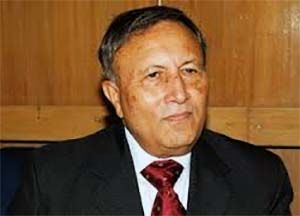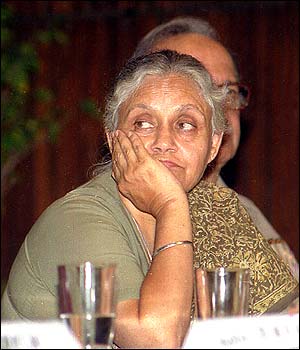 At a Bharatiya Janata Party public meeting in January 2003, the Sapre school ground in the heart of Raipur, Chhattisgarh’s capital city, was jam-packed with party workers. Just as Rajnath Singh, then general-secretary of the party and chief guest at the meeting, was about to start his speech, a group of workers started raising slogans. Singh, then in charge of party affairs for Chhattisgarh, stopped, turned towards the workers and tried to listen. “Rajyapal ko hatao, rajyapal ko hatao (remove the governor),” chanted the workers.
At a Bharatiya Janata Party public meeting in January 2003, the Sapre school ground in the heart of Raipur, Chhattisgarh’s capital city, was jam-packed with party workers. Just as Rajnath Singh, then general-secretary of the party and chief guest at the meeting, was about to start his speech, a group of workers started raising slogans. Singh, then in charge of party affairs for Chhattisgarh, stopped, turned towards the workers and tried to listen. “Rajyapal ko hatao, rajyapal ko hatao (remove the governor),” chanted the workers.
Singh smiled and began his speech.
A few months later, Dinesh Nandan Sahay, Chhattisgarh’ss first governor, was transferred to Tripura by the then National Democratic Alliance central government. Sahay, an Indian Police Service officer of the Bihar cadre, was appointed Chhattisgarh governor on November 1, 2000, the day the state came into being.
In the past 14 years, Sahay was among the four Chhattisgarh governors who didn’t complete five years in office. He had tried to develop cordial ties with the state government, irrespective of the party in power at the Centre. And, he had to pay a price for it.
A section of BJP leaders in Chhattisgarh launched a campaign against Sahay, citing his alleged proximity to then chief minister Ajit Jogi. But there was another version to the story -- a Union minister in the Atal Bihari Vajpayee government had led the campaign against Sahay, allegedly out of personal interest. The minister, a party leader said, hadn’t received an invitation for the convocation ceremony at Pt Ravi Shankar Shukla University. Hurt, he put the blame on Sahay.
Raj Bhawan officials during Sahay’s term said the governor was working on a long-term strategy, with the interests of Chhattisgarh and its people in mind. “Since Chhattisgarh was just born, Sahay wanted everyone to join hands and work for the development of the state,” said one of the officials, adding he never wanted a confrontation between Raj Bhawan and the state government.
Though Sahay had good rapport with NDA leaders, the campaign against him by party leaders in the state forced party seniors to transfer him to Tripura.
On June 2, 2003, Krishna Mohan Seth took oath as the second governor of Chhattisgarh. Seth was transferred from the Tripura Raj Bhawan.
In November that year, Chhattisgarh went to the polls and the BJP came to power. Subsequently, the NDA was replaced by the United Progressive Alliance government in New Delhi. Seth, who had established good relations with Chief Minister Raman Singh, was asked to continue.
After Seth completed his term in January 2007, the UPA government appointed E S L Narasimhan, former Intelligence Bureau chief and an IPS officer of the Andhra Pradesh cadre, as governor. He, too, developed good ties with the state government. Narasimhan, the IPS batchmate of Ajit Jogi, the Congress stalwart in the state, ensured there were no potential confrontations.
When the Telangana issue came to the fore, the UPA government decided to transfer Narasimhan to the Hyderabad Raj Bhawan, owing to his experience in the intelligence wing and state police.
On January 23, 2010, Shekhar Dutt was appointed governor. A former army officer and bureaucrat, Dutt had earlier worked as Divisional Commissioner of Raipur. A day before his recent resignation, Dutt and Raman Singh met over lunch. Buzz of Singh being convinced that Dutt shouldn’t be removed from his post was doing the rounds.
Dutt’s resignation has come as a surprise and sparked a debate on the parameters for the removal of a governor. If Dutt has been asked to leave because Gandhi family confidant Pulok Chatterji is his close relative, the Congress could well ask why Seth, one of whose close relatives is in the Vishwa Hindu Parishad, continued as Chhattisgarh governor when the UPA was in power at the Centre.
Image: Governor of Chhattisgarh Shekhar Dutt has resigned.











